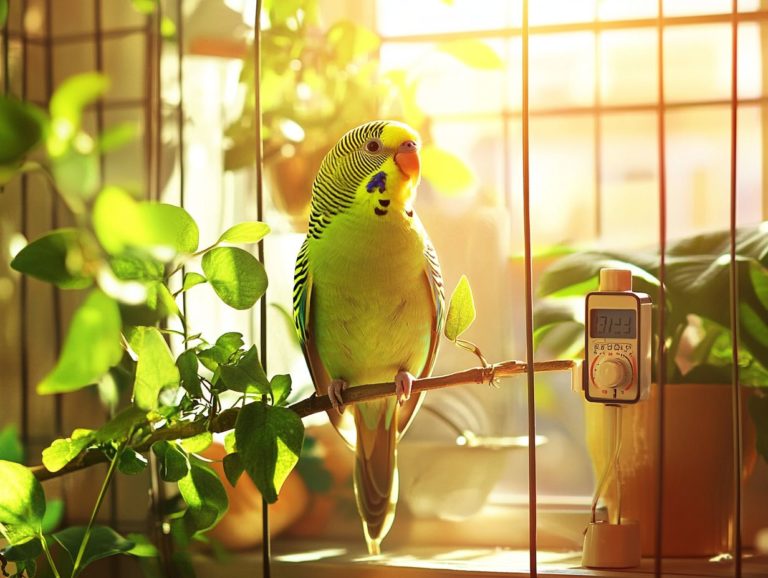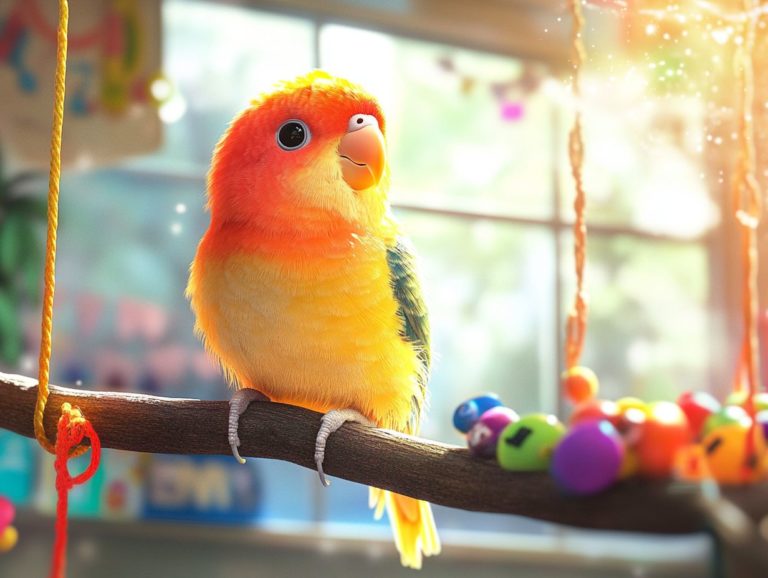How Do I Know If My Bird Is Overweight?
Birds bring joy and companionship into your life, but their health and well-being often hinge on a proper diet and regular exercise to maintain a healthy weight.
Overweight birds can encounter serious health risks, yet many owners may not recognize the subtle signs. Join us as we explore the causes of obesity in birds! This article will help you identify the telltale signs of an overweight feathered friend and provide practical tips for improving their health.
Discover how to keep your avian companion fit and thriving!
Contents
Key Takeaways:
- Regularly monitor your bird’s diet and exercise to prevent weight gain. Poor nutrition and lack of physical activity are the main causes of bird obesity, which can lead to serious health conditions.
- Watch out for physical and behavioral changes such as difficulty flying, lethargy, and excessive preening. These are signs that your bird may be overweight and in need of intervention.
- Overweight birds are at a higher risk for health complications such as heart disease and joint problems. It is important to address the issue promptly and consult with a veterinarian for guidance on proper care and nutrition.
Causes of Overweight Birds
Overweight birds, especially beloved pet species like parrots, such as Galahs and Budgerigars, are becoming alarmingly common among bird owners. This trend often arises from a mix of inadequate diet and insufficient exercise.
The roots of obesity in birds can vary. They are influenced by factors such as the quality of their food, their level of physical activity, and their overall lifestyle in captivity. This often includes considerations of their size and breeding habits. Gaining a proper understanding of these causes is essential for ensuring the health and well-being of your feathered companions.
Diet and Exercise Factors
The diet and exercise of birds are crucial factors in shaping their overall health and weight. Adopting a balanced approach is essential for preventing obesity-related conditions.
A well-rounded diet is key to achieving vibrant feathers, robust immunity, and optimal energy levels. A foundation of high-quality pellets provides the essential vitamins and minerals your bird needs. Enhancing their diet with a variety of fresh fruits and vegetables, as well as occasional nuts, not only adds flavor but also delivers nutrients and hydration.
However, it’s wise to limit high-fat foods like sunflower seeds and human-grade monkey nuts, as they can lead to unnecessary weight gain.
Regarding exercise, creating an engaging environment filled with toys and climbing structures can inspire natural foraging and movement. Tailoring activities to specific species like flight or climbing mimics their natural behaviors and promotes physical fitness.
Identifying Signs of Overweight Birds
Recognizing the signs of overweight birds is an essential aspect of responsible pet ownership. It allows for early detection and proactive management of potential health concerns.
Stay attentive to various symptoms that may indicate excess weight. Look for signs such as difficulty in flight, diminished energy levels, and notable changes in behavior or handling. Each of these signs can hint at an underlying condition that could necessitate veterinary intervention.
Physical and Behavioral Changes
Physical and behavioral changes in overweight birds can offer you valuable insights into their health status and overall well-being. They often shed light on underlying obesity-related conditions.
These changes might not be immediately apparent, but they can reveal themselves in various ways. For instance, as your bird gains weight, you may notice a more pronounced bony ridge, where the skeletal structure stands out due to excess fat.
The condition of their feathers might decline, appearing unkempt or oily an indication of a poor diet. Behaviorally, you may observe a decrease in activity levels; your bird might seem lethargic and reluctant to explore its surroundings.
Social interactions can also take a hit. A usually sociable bird might withdraw from playtime with its companions, signaling discomfort or distress. Such signs should prompt you to take swift action to address your pet’s health, ensuring they thrive and feel their best.
Act now: Check your bird’s weight today and start a healthier routine!
Health Risks for Overweight Birds
Overweight birds face a range of health risks, including serious conditions such as kidney disease and atherosclerosis. These issues can greatly affect their quality of life and longevity. As a bird owner, you need to spot these problems early and take steps to mitigate them through careful care.
Potential Health Complications
The potential health complications for overweight birds can be serious. They often require your attentive monitoring and, if necessary, veterinary intervention to prevent more severe conditions.
Among these complications are lipomas, or fatty tumors that may develop under the skin. They can lead to issues such as fatty deposits in the skin that can cause discomfort and hinder mobility. Additionally, pododermatitis is an inflammation of the feet due to excess weight, resulting in painful sores that make it hard for your bird to perch comfortably.
Heart-related issues, such as congestive heart failure, can also arise. Watch for symptoms like difficulty breathing, lethargy, or sudden behavioral changes. Monitor your bird for signs such as difficulty flying, wing drooping, or changes in appetite.
Early detection is key. Prompt vet visits can significantly enhance the likelihood of successful treatment and improve your bird’s overall well-being.
How to Help Your Overweight Bird
Helping your overweight bird reach a healthy weight requires a well-rounded approach. This includes dietary adjustments, like feeding suitable pellets and fruits, along with consistent exercise and personalized care tips tailored to your pet’s specific needs.
Diet and Exercise Tips
Implementing effective diet and exercise tips is essential for guiding your overweight bird toward a healthier weight and lifestyle.
By prioritizing low-fat pelleted food, you can ensure your feathered companion gets vital nutrients without the excess calories. Avoid high-calorie treats to prevent weight gain and protect overall health.
Instead, increase fresh fruits and vegetables, which serve as lower-calorie alternatives while providing necessary vitamins and minerals to keep your bird thriving.
For exercise, incorporate interactive toys to engage your bird both mentally and physically. Allowing flight in a secure area promotes natural movement and better cardiovascular health.
Preventing Obesity in Birds
Preventing obesity in birds is a vital aspect of responsible pet ownership that impacts their health and overall well-being. This requires a thoughtful approach that combines a balanced diet, proper nutrition, regular exercise, and diligent upkeep.
By committing to these practices, you can ensure a healthy and vibrant lifestyle for your feathered friends.
Best Practices for Bird Health
Implementing best practices for bird health is crucial for preventing obesity and ensuring your pet bird enjoys a happier, healthier life. Regular veterinary visits are essential for monitoring your bird s health and weight, allowing for early detection of potential issues.
Offer a diet rich in nutrients tailored to your bird’s species. Each bird has unique dietary needs, and providing the right food helps maintain an ideal weight while fostering energy and vitality. Coupling this with dedicated exercise routines like opportunities for flight or engaging activities can significantly boost their physical health and mental stimulation.
As a responsible owner, staying informed about these aspects is vital for ensuring a fulfilling life for your avian companion, which includes understanding their weight, exercise needs, and proper handling techniques.
Frequently Asked Questions
What can I do if my bird refuses to exercise?
Encourage playtime with fun toys to get your bird moving!
How can I tell if my bird is overweight? Look for signs like difficulty flying, changes in appetite, or lethargy. It’s also helpful to know how to monitor your bird’s weight for a clearer assessment.
How Do I Know If My Bird Is Overweight?
Birds can become overweight, just like humans. It’s vital to monitor their weight for their health and well-being. To learn more, check out this guide on how to manage weight issues in pet birds. Here are some signs your bird may be overweight:
- Difficulty flying or moving around
- Waddling when walking
- Abdomen protruding from the sides
- Poor feather maintenance
- Increased lethargy and lack of energy
What Factors Contribute to Bird Overweight?
Several factors can lead to a bird becoming overweight:
- Lack of exercise
- Overfeeding or providing high-fat foods
- Insufficient mental stimulation and foraging opportunities
- Genetic predisposition or underlying health issues
How Can I Help My Bird Lose Weight?
If you think your bird is overweight, consult a veterinarian. Here are some effective ways to help your bird shed pounds:
- Adjust their diet to include more fresh fruits and vegetables.
- Increase exercise through playtime and more flight opportunities for better muscle development.
- Provide mental stimulation with foraging toys and puzzles.
- Regularly monitor their weight to prevent obesity and maintain health.
How Often Should I Check My Bird’s Weight?
Weigh your bird at least once a week to track their weight. If they re on a weight-loss plan or have health issues, weigh them every other day.
Can I Use a Human Scale to Weigh My Bird?
Using a human scale is not accurate for weighing birds. Invest in a small animal scale or take your bird to a vet with the proper equipment.
Are Certain Bird Species More Prone to Weight Gain?
Yes, species like cockatoos, cockatiels, African grey parrots, Galahs, and Budgerigars can gain weight easily. Be vigilant with their diet and exercise to prevent obesity-related health issues.





